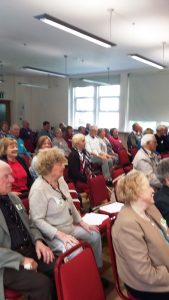Housing for Older People: Evidence based Decision Making



Fingal Age Friendly Alliance established an interagency Housing Sub-Committee to ascertain the housing needs of older people and promote the development of Age Friendly Housing. Consultations with older people during the development of Fingal’s Age Friendly Strategy highlighted their wish to remain living in their own home and uncertainties around the availability of social, health and care supports locally as they age. Research was undertaken to ensure the rationale for an interagency approach for the development of housing was clear and to provide evidence for effective decision making. Research on best practice and mapping of the demographic profile, services and facilities in Fingal, demand by over 55s for housing together with “empty nesters” and alternative accommodation was undertaken. Data from research undertaken by the ‘Healthy and Positive Ageing Initiative’ in Fingal was analysed, to ascertain attitudes of older people to adapting their home, moving to alternative accommodation and social engagement.
From the data gathered a number of possible locations for housing were identified which also facilitated the optimisation of available services. It is apparent from the evidence, that while one type of development may work well in one location, it may be inappropriate in another and as such a number of potential sites offering different tenure, management structure and services are required to deliver an effective housing policy for all older people in Fingal. And while building works have not yet commenced, negotiations are on-going. However, the initiative also provided an opportunity for all stakeholders to assess their own criteria for decision making in areas which affect older people.
Main target group: Older people in general
Sector(s): Health, Housing
Desired outcome for older people:
Meet their basic needs
Name: DeBairtiseil, íde
Email address: Ide.DeBairtiseil@fingal.ie
Preferred language(s): English